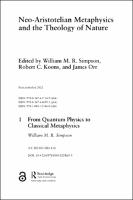Chapter 1 From Quantum Physics to Classical Metaphysics
Proposal review
Abstract
"In this chapter, I argue that Aristotle's doctrine of hylomorphism, which con-
ceived the natural world as consisting of substances which are metaphysically
composed of matter and form, is ripe for rehabilitation in the light of quantum
physics. I begin by discussing Aristotle's conception of matter and form, as
it was understood by Aquinas, and how Aristotle's doctrine of hylomorphism
was `physicalised' and eventually abandoned with the rise of microphysicalism.
I argue that the phenomenon of quantum entanglement, and the emergence of
irreducibly macroscopic phenomena in nite temperature quantum systems,
have given us good reasons to doubt the truth of microphysicalism. In support
of my argument, I show how to construct a hylomorphic interpretation of the
de Broglie-Bohm theory that posits a single Cosmic Substance. I then show
how to construct a hylomorphic interpretation of an alternative `contextual'
wave function collapse theory (recently proposed by the physicists Barbara
Drossel and George Ellis) which posits a plurality of Thermal Substances.
Both of these neo-Aristotelian ontologies reject the microphysicalist dogma
that nature consists fundamentally of some set of microscopic constituents."
Keywords
"hylomorphism; causal powers; quantum mechanics; quantum statistical mechanics; open quantum systems; Bohmian mechanics; wave function collapse; substantial form"DOI
10.4324/9781003125860-3ISBN
9780367637149, 9780367646981, 9781003125860Publisher
Taylor & FrancisPublisher website
https://taylorandfrancis.com/Publication date and place
2022Imprint
RoutledgeClassification
Philosophy
Philosophy: metaphysics and ontology
Philosophy of religion


 Download
Download